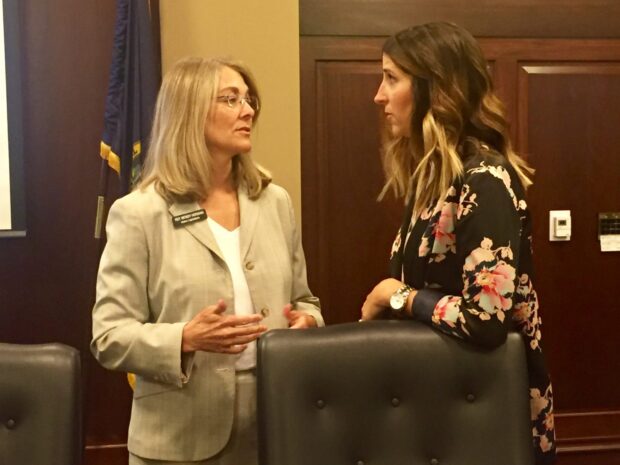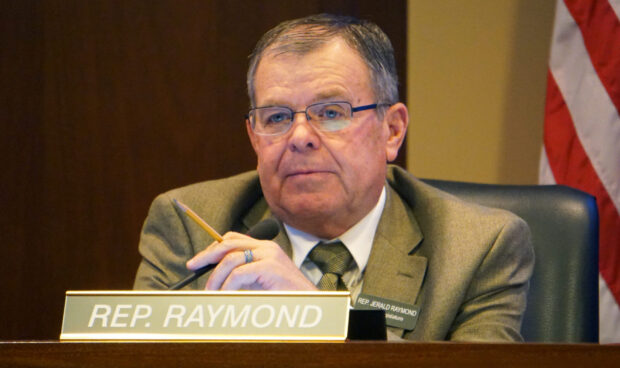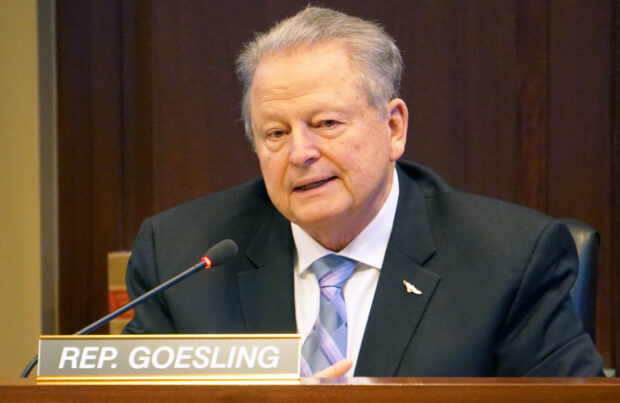It came down to the wire, but a bill to rewrite Idaho’s K-12 funding formula made its debut Monday afternoon.
The Senate Education Committee introduced a proposal that would roll out a new formula over five years, beginning July 1, 2021.

The bill is the latest step in a process that began in 2016. The bill’s co-sponsors — Sen. Lori Den Hartog, R-Meridian, and Rep. Wendy Horman, R-Idaho Falls — served on a legislative committee that spent three summers studying a rewrite in Idaho’s complex school funding formula. The state hasn’t overhauled the funding formula since 1994.
The sponsors said they want to begin the transition to “a flexible, transparent per-pupil funding formula based on student enrollment,” according to the bill’s statement of purpose. Advocates say an enrollment-based model would better fit a more mobile student population — and a evolving school environment reshaped by online and dual-credit courses.
At only nine pages, the Den Hartog-Horman bill is considerably shorter than the 60-plus page bills floated during the 2019 session. But the short bill contains one key wrinkle: It would be “revenue neutral.” In other words, the lawmakers aren’t suggesting putting new money into the K-12 formula to smooth out the transition.
That caught the attention of Sen. Janie Ward-Engelking, D-Boise, another veteran of the Legislature’s funding formula committee. “You’re going to have a lot of winners and losers.”
Den Hartog said she didn’t disagree. But she suggested it was time to make a transition, after lawmakers have spent years running scenarios about how a new formula might affect individual schools and districts.
Senate Education voted unanimously to introduce the funding formula bill, which means it could come back to committee for a full hearing later this session.
All told, Senate Education quickly introduced nine pieces of legislation Monday afternoon — covering everything from academic standards to recruiting and retaining rural teachers. Under legislative rules, Monday was the last day the committee could take up a new bill, leading to the logjam of last-minute proposals.
No appetite for grocery tax repeals
There was the legislative equivalent of a cleanup on Aisle Three Monday morning, as three grocery tax repeal bills went nowhere in the House’s Revenue and Taxation Committee.
The moves could clear the path for the committee to consider a bill to increase the state’s income tax credit for groceries. House Speaker Scott Bedke has already introduced two bills to boost the credit, and according to Tuesday’s committee agenda, the Oakley Republican will be back to introduce a third grocery tax credit proposal.
Most Idahoans now receive a $100-per-person credit; seniors receive $120. Gov. Brad Little has proposed providing some grocery tax relief and covering the costs with proceeds from Internet sales taxes — meaning the state wouldn’t have to dip into the state general fund budget that bankrolls K-12 and higher education.
But on Monday, the focus was on an outright repeal of the sales tax on groceries. Legislators passed a repeal in 2017, but then-Gov. Butch Otter vetoed the bill.
This time around, Revenue and Taxation did the vetoing. The committee voted against introducing a pair of repeal proposals — one from Rep. Priscilla Giddings, R-White Bird, and one from Rep. Randy Armstrong, R-Inkom.
The bills differed on definitions: what the state would classify as a tax-exempt grocery. Armstrong’s bill tried to draw a more narrow definition of staple food items — meaning snacks and soft drinks would have been subject to the sales tax.
Committee members seemed to agonize over how to define groceries — with Rep. Robert Anderst, R-Nampa, saying he was worried the state would be struggling every year to fine-tune definitions.
After the committee voted down the Giddings and Armstrong proposals, House Majority Leader Mike Moyle pulled his own proposal without a vote. That happened after Moyle, R-Star, argued against his own bill. He said the grocery tax hits a broad cross-section of consumers, from out-of-state tourists to “illegal aliens.” The most effective form of tax relief, he said, would be an increase in the grocery tax credit.
Moyle’s support of an increased credit isn’t really new, however; he has signed on as a co-sponsor of Bedke’s previous bills to boost the credit.
Technology funding
While several other committees were racing to introduce new bills Monday, the House Education Committee took the scenic route.
Under legislative rules, House Education is considered a privileged committee, meaning Monday’s bill introduction deadline didn’t apply to it and a small number of other committees that are free to print new bills late into the session.

Nevertheless, House Education did introduce two bills of its own.
The first, pushed by Rep. Jerald Raymond, R-Menan, would change the way Idaho distributes funding to school districts to buy digital content and curriculum materials.
Raymond said the Legislature has appropriated about $200 million over the past eight years for technology for school districts. The Joint Finance-Appropriations Committee dedicates a part of the “content and curriculum” line item for local school districts. But that money is distributed based on a formula, which Raymond said may only amount to $5,000 per school district, which he said isn’t enough to purchase high-quality digital curriculum materials.
“Quite frankly, that formula has not been working as well as we hoped or anticipated,” Raymond said.
If his bill is signed into law, the money would be distributed based on a first-come, first-served block grant program, with grants capped at $50,000 per school district or charter.
Raymond’s bill doesn’t seek to increase the overall pool of funding, just change the way it is distributed.
The committee voted unanimously to introduce Raymond’s bill, clearing the way for it to return to House Education for a full hearing and vote.
World language proficiency
Raymond also pushed the second new bill House Education introduced Monday. Through that bill, Raymond is seeking to recognize students who become proficient in a second language, other than English, through a new, statewide “seal of biliteracy” that would be attached to a student’s high school diploma when they graduate.
Under the bill, students would be able to demonstrate proficiency through a number of means, including passing an Advanced Placement exam with a score of three or higher, or passing an International Baccalaureate exam with a score of four or better.
House Education voted unanimously to introduce the bill, which will allow it to come back before the committee at a later date for a full hearing.
School enrollment for military families
The House Education Committee has advanced a bill that is designed to make school enrollment and participation in charter lotteries easier for military families relocating to Idaho.

Pushed by Rep. Bill Goesling, R-Moscow, House Bill 388, would allow children from military families who are preparing moving to Idaho — but who have not yet arrived in Idaho — to participate in registration or enrollment at the same time the process is open to the general student population. If passes into law, the bill would temporarily waive proof of residency requirements until the student begins school.
That means, for example, the family with military orders to move to Idaho over the summer months would be able to participate in the registration or school lotteries during the spring, with the rest of the student population, rather than having to wait until they physically arrive in Idaho.
Goesling, a veteran of the United State Navy, said that will make it so that families don’t miss out on enrollments or lotteries while they are in the process of preparing to move to Idaho.
HB 388 heads next to the House floor with a recommendation it passes.
